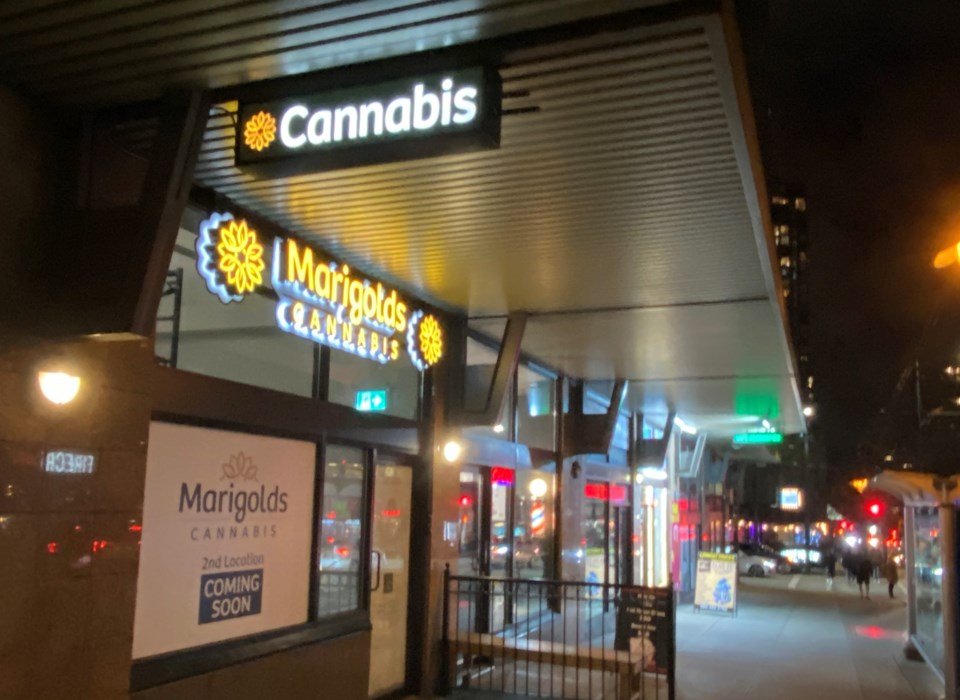Legal cannabis wholesales in B.C. in the quarter that ended in September grew at the slowest pace in the 10 quarters since the B.C. Liquor Distribution Branch started releasing records, according to new data.
The numbers could indicate that the legal cannabis market is maturing and that slower growth could be expected. It may also be more evidence that B.C. consumers are cutting back in their spending. Restaurant sales growth in B.C. is lagging other provinces while alcohol wholesales in B.C. have declined in total dollars spent in each of the past four quarters year-over-year.
Private stores and government stores spent $147,211,721 to buy all forms of cannabis in the three months up to the end of September, up 7.4 per cent from the $137,126,714 purchased in the same quarter one year earlier, according to the BCLDB.
While 7.4-per-cent growth in wholesales may sound impressive, it is tepid growth for cannabis, which became legal in Canada in October 2018.
Go back to the same quarter one year ago. Wholesales in the quarter that ended in September 2023 were up 24.3 per cent, compared with the same three months in 2022, when retail buyers spent $110,290,429 on those products.
The pace of wholesales growth then fell from that 24.3-per-cent rate to 20.5 per cent in the quarter that ended in December 2023 and then to slightly more than 10-per-cent growth in each of the next two quarters (10.3 per cent in the quarter ended in March, and 10.6 per cent in the quarter ended in June).
The BCLDB’s first release of quarterly wholesales data was for the three months that ended 2022.
Before then, Statistics Canada released sales data for retail sales in B.C. During the early days of the COVID-19 pandemic, cannabis retail sales growth in B.C. was sky high, according to the national number cruncher: almost seven times as much on a year-over-year basis in June 2020.
Retail advocates and entrepreneurs chalk the lowered growth rate for wholesales up to how people are feeling less wealthy than they did a few years ago.
Yes, Canada's inflation rate has steadily declined, and was 1.9 per cent in November, down from a 39-year high of 8.1 per cent in June 2022. Many people's incomes, however, have not kept up with years when inflation was higher-than average.
"No one has any money," said Evergreen Cannabis owner Mike Babins. "Everyone's broke."
He told BIV that he has spoken with many other retailers in his block of West 4th Avenue, between MacDonald and Bayswater streets, and many of them have similarly told him that their business is down.
While retailers that sell beer and wine are able to entice shoppers with the perk of the store will temporarily not charge customers the goods and services tax (GST), that is not the case for cannabis.
"We've been finding the best deals possible so we can offer our customers the best quality for the cheapest price," he said.
Jaclynn Pehota, executive director at the Licensed Retail Cannabis Council of BC (LRCCBC) said retailers across her sector are struggling.
"Sales definitely have been sluggish," she said.
A LRCCBC poll last month found 58 per cent of its members responded that their businesses were facing financial hardship.
The number of legal cannabis stores in the province has been relatively flat, according to B.C. government data.
B.C. had 490 legal cannabis stores at the end of September 2023, according to the government. That number fell by one, to 489, as of Dec. 16.
That number is expected to rise, however, as Surrey city council in November approved licensing 12 stores in that sprawling suburb.
That will mean more competition for the legal cannabis dollar.
Driving overall cannabis wholesales growth has been sharply higher demand in the biggest cannabis category: inhalable extracts.
That category saw buyers spend $52,744,677 in the three months up to the end of September, up 14.4 per cent from the $46,120,036 spent on wholesales in the same quarter one year earlier.
Loose flower not in pre-rolls was the second largest category for wholesales in the quarter up to the end of September, with buyers spending $45,146,482, up two per cent from the same quarter one year earlier.
Pre-rolls were the third-largest category, with wholesale buyers shelling out $34,384,453 in the quarter up to the end of September. That was up 8.6 per cent from the same quarter one year earlier.
Interest in growing cannabis at home appears to be on the wane.
Wholesale buyers spent only $10,582 on cannabis seeds in the quarter up to the end of September, down 18.2 per cent from the $12,929 spent in the same quarter one year earlier.
Overall wholesales for cannabis are tiny compared with those for alcohol.
For every dollar spent on wholesale cannabis, more than $23.64 was spent on wholesale alcohol by operators at private stores, restaurants, pubs, bars and government stores.
In the four quarters combined, up to the end of September, wholesale buyers purchased $3,480,292,778 worth of alcoholic drinks from the BCLDB, according to its quarterly market reports. That is down 6.24 per cent from the $3,711,850,879 spent in the four quarters up to September 2023.
In the four quarters combined, up to the end of September, wholesale buyers purchased $556,480,426 worth of cannabis. That is up 11.9 per cent from the $497,290.428 in the same four quarters one year earlier.




